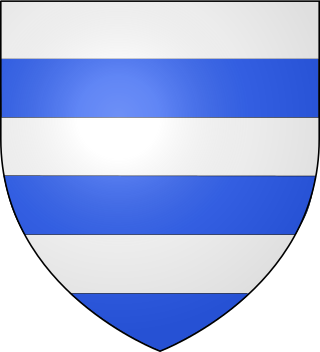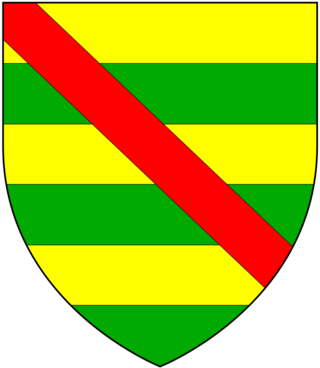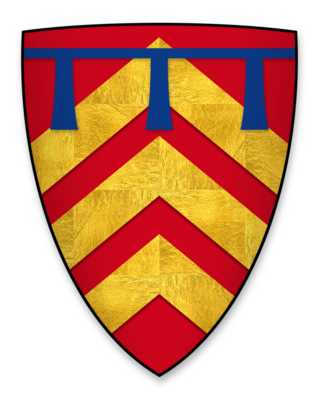Related Research Articles

Earl of Surrey is a title in the Peerage of England that has been created five times. It was first created for William de Warenne, a close companion of William the Conqueror. It is currently held as a subsidiary title by the Dukes of Norfolk.

John de Warenne, 6th Earl of Surrey was a prominent English nobleman and military commander during the reigns of Henry III of England and Edward I of England. During the Second Barons' War he switched sides twice, ending up in support of the king, for whose capture he was present at Lewes in 1264. Warenne was later appointed as "warden of the kingdom and land of Scotland" and featured prominently in Edward I's wars in Scotland.

William de Warenne, 2nd Earl of Surrey was the son of William de Warenne, 1st Earl of Surrey and his first wife Gundred. He was more often referred to as Earl Warenne or Earl of Warenne than as Earl of Surrey.

John de Warenne, 7th Earl of Surrey, was the last Warenne Earl of Surrey.

Richard de Grey of Codnor, Derbyshire, was a landowner who held many important positions during the reign of Henry III of England, including Warden of the Isles 1226–1227, 1229–1230 and 1252–1254, and later both Constable of Dover Castle and Warden of the Cinque Ports from 1258 irregularly to 1264.
Richard FitzRoy was the illegitimate son of King John of England and was feudal baron of Chilham, in Kent. His mother was Adela de Warenne, his father's first cousin and a daughter of Hamelin de Warenne by his wife Isabel de Warenne, 4th Countess of Surrey.

The House of Mowbray was an Anglo-Norman noble house, derived from Montbray in Normandy and founded by Roger de Mowbray, son of Nigel d'Aubigny.
Bardolph or Bardolf is a surname and, in Middle English, a personal name. It originates from the Continental Germanic Bartholf or Bardwulf, from bard meaning "axe" and wulf meaning wolf, via the Old French Bardol(f). It may refer to:
William Bardolf, 4th Baron Bardolf and 3rd Baron Damory of Wormegay, Norfolk, was an extensive landowner in Norfolk, Lincolnshire, Suffolk and Surrey. He was the son of John Bardolf, 3rd Baron Bardolf and Elizabeth Damory, suo jure 2nd Baroness Damory. His maternal grandparents were Sir Roger Damory, Lord Damory and Lady Elizabeth de Clare, a granddaughter of King Edward I. In 1372, Bardolf had livery of his lands from the Crown - See.

Michael de Poynings, 1st Baron Poynings, Knt., of Bures St. Mary, Suffolk, was an English nobleman and soldier. He was present at the Battle of Crécy.

Richard de Montfichet was a Magna Carta surety. He was a landowner in Essex.

Hugh d'Aubigny, 5th Earl of Arundel was the last in the Aubigny male line to hold Arundel Castle.
Thomas Bardolf, 5th Baron Bardolf was an English baron who was the Lord of Wormegay in Norfolk, of Shelford and Stoke Bardolph in Nottinghamshire, and of Hallaton (Hallughton) in Leicestershire, among others, and was "a person of especial eminence in his time".
Alan la Zouche (1205–1270) was an Anglo-Norman nobleman and soldier of Breton descent. He built the Zouches Manor in Cambridgeshire. He was High Sheriff of Northamptonshire from 1261 to 1266.
Reginald de Warenne was an Anglo-Norman nobleman and royal official. The third son of an earl, Reginald began his career as an administrator of his brother's estates and continued to manage them for his brother's successor, William, the second son of King Stephen. Reginald was involved in the process that led to the peaceful ascension of Henry fitzEmpress to the throne of England in 1154 and served the new king as a royal justice afterwards. He played a minor role in the Becket controversy in 1170, as a member of the party that met Becket on his return to England from exile in 1170.
William de Warenne, the feudal baron of Wormegay, served as a royal justice under King Richard I and his brother King John. Warenne also served in financial matters, being one of those responsible for collecting taxes and later overseeing debts from Christians to Jews. His career was closely tied to that of Hubert Walter, who employed Warenne as a judge in some ecclesiastical matters. He also founded a priory and gave other gifts to religious houses. The historian Ralph V. Turner said of Warenne that "although he was a longtime official under King John, he did not quite fit into the inner corps of royal counselors".

The Aguillon family, of French origin, were feudal landowners in England who held estates in several southern counties from before 1135 to 1312. Surviving records suggest various branches which all ended without male heirs, the lands going to daughters or sisters and their husbands. The family seems to have been initially associated, perhaps as under-tenants and maybe through marriage, with the Marmion family, witnessing charters alongside them in Normandy in 1106 and later occupying their land in England.
John III Lestrange, of Knockin in Shropshire, landowner, administrator and soldier, was a marcher lord defending England along its border with Wales.
Isabel de Warenne, Countess of Arundel was an English peer. She was widowed when she was about 17 years old, with a large estate, upon which she founded a Cistercian order convent, England's only convent to be Cistercian at the time of its founding. In 1252, she rebuked King Henry III for not paying her money she was owed.
Osbern fitzRichard was a Frenchman, perhaps Norman, who was a landowner and tenant-in-chief in England. Osbern served as a royal judge and sided with the baronial rebels at the start of King William II's reign, although he later returned to the king's service.
References
- 1 2 3 4 5 6 7 8 9 10 11 12 13 Clive H. Knowles (23 September 2004). "Oxford Dictionary of National Biography" . Oxford Dictionary of National Biography (online ed.). Oxford University Press. doi:10.1093/ref:odnb/1361.(Subscription or UK public library membership required.)
- 1 2 3 4 5 Round, J. Horace (1885). . Dictionary of National Biography . Vol. 3. p. 176.